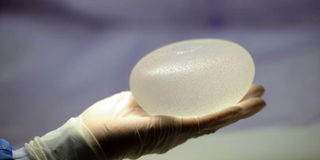New cancer fears in France over breast implants

This file picture taken on January 12, 2012 in Boissy-l'Aillerie, northern Paris, shows a technician presenting a silicone breast implant. French Health Minister Marisol Touraine stated on March 17, 2015, that women with breast implants did not need to have them removed despite reports of cancer cases in some women. PHOTO | AFP
What you need to know:
- The national cancer institute (INCa) said there had been 18 cases of the rare disease — anaplastic large cell lymphoma — since 2011, linked to the silicone breast implant.
- The country's health minister immediately sought to calm fears, with memories of faulty breast implants from the French firm PIP still fresh in the memory.
PARIS,
France's national cancer institute said on Tuesday there was a "clearly established link" between a rare form of cancer and a certain type of breast implant, as the health minister sought to allay fears.
The national cancer institute (INCa) said there had been 18 cases of the rare disease — anaplastic large cell lymphoma — since 2011, linked to the silicone breast implant.
Given the rarity of the cases, the INCa said there was no need to recommend the removal of the implants.
"This complication presents very infrequently," the body said.
The country's health minister immediately sought to calm fears, with memories of faulty breast implants from the French firm PIP still fresh in the memory.
NO WORRIES
"We do not recommend that women carrying these implants have them removed," Marisol Touraine told reporters.
She urged women not to be "carried away by excessive worry" about the implants.
"Our vigilance is absolute," she said.
The head of the INCa, Agnes Buzyn, said the increased detection rate could also be down to better screening.
No brand or type of implant has been specifically "called into question", insisted Touraine.
According to Francois Hebert, deputy head of the drugs agency ANSM, around 400,000 women carry breast implants in France — 80 percent for aesthetic reasons and 20 percent as a result of breast cancer.
French firm PIP sparked a global health scare in 2011, when plastic surgeons began reporting an unusual number of ruptures in their products.
The PIP implants were banned and the company eventually liquidated.




